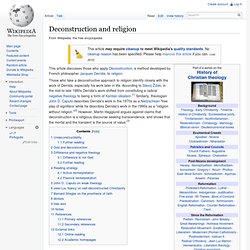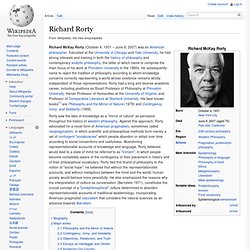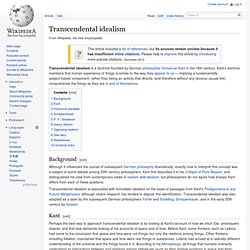

Deconstruction and religion. This article discusses those who apply Deconstruction, a method developed by French philosopher Jacques Derrida, to religion.

Those who take a deconstructive approach to religion identify closely with the work of Derrida, especially his work later in life. According to Slavoj Žižek, in the mid-to-late 1980s Derrida's work shifted from constituting a radical negative theology to being a form of Kantian idealism.[1] Similarly, theologian John D. Caputo describes Derrida's work in the 1970s as a Nietzschean 'free play of signifiers' while he describes Derrida's work in the 1990s as a "religion without religion. "[2] However, Martin Hagglund argues against claims that deconstruction is a religious discourse seeking transcendence, and shows that the mortal and the transient is the source of value.[3] Undeconstructibility[edit] A vital feature of Derrida's work later in life is the notion of "undeconstructibility".
Further reading[edit] God and deconstruction[edit] Différance is not God[edit] Richard Rorty. Richard McKay Rorty (October 4, 1931 – June 8, 2007) was an American philosopher.

Educated at the University of Chicago and Yale University, he had strong interests and training in both the history of philosophy and contemporary analytic philosophy, the latter of which came to comprise the main focus of his work at Princeton University in the 1960s. He subsequently came to reject the tradition of philosophy according to which knowledge concerns correctly representing a world whose existence remains wholly independent of those representations. Rorty had a long and diverse academic career, including positions as Stuart Professor of Philosophy at Princeton University, Kenan Professor of Humanities at the University of Virginia, and Professor of Comparative Literature at Stanford University. His best known books[1] are Philosophy and the Mirror of Nature (1979) and Contingency, Irony, and Solidarity (1989). Biography[edit] "Nothing is sacred to Rorty the ironist. Transcendental idealism. Transcendental idealism is a doctrine founded by German philosopher Immanuel Kant in the 18th century.

Kant's doctrine maintains that human experience of things is similar to the way they appear to us — implying a fundamentally subject-based component, rather than being an activity that directly (and therefore without any obvious causal link) comprehends the things as they are in and of themselves. Background[edit] Although it influenced the course of subsequent German philosophy dramatically, exactly how to interpret this concept was a subject of some debate among 20th century philosophers. Kant first describes it in his Critique of Pure Reason, and distinguished his view from contemporary views of realism and idealism, but philosophers do not agree how sharply Kant differs from each of these positions.
Kant[edit] Historical parallels[edit] Xenophanes of Colophon in 530 BC anticipated Kant's epistemology in his reflections on certainty. Major Philosophical Topics at Erratic Impact's Philosophy Research Base. 40 Belief-Shaking Remarks From a Ruthless Nonconformist. If there’s one thing Friedrich Nietzsche did well, it’s obliterate feel-good beliefs people have about themselves.

He has been criticized for being a misanthrope, a subvert, a cynic and a pessimist, but I think these assessments are off the mark. I believe he only wanted human beings to be more honest with themselves. He did have a remarkable gift for aphorism — he once declared, “It is my ambition to say in ten sentences what others say in a whole book.” A hundred years after his death, Nietzsche retains his disturbing talent for turning a person’s worldview upside-down with one jarring remark. Even today his words remain controversial. Here are 40 unsympathetic statements from the man himself. 1. 2. 3. 4. 5. 6. 7. 8. 9. 10. 11. 12. 13. 14. 15. 16. 17. 18. 19. 20. 21. 22. 23. 24. 25. 26. 27. 28. 29. 30. 31. 32. 33. 34. 35. 36. 37. 38. 39. 40.
More of Nietzsche’s genius here. Have a lot on your mind? Everyday mindfulness has transformed my life, and the lives of many others.